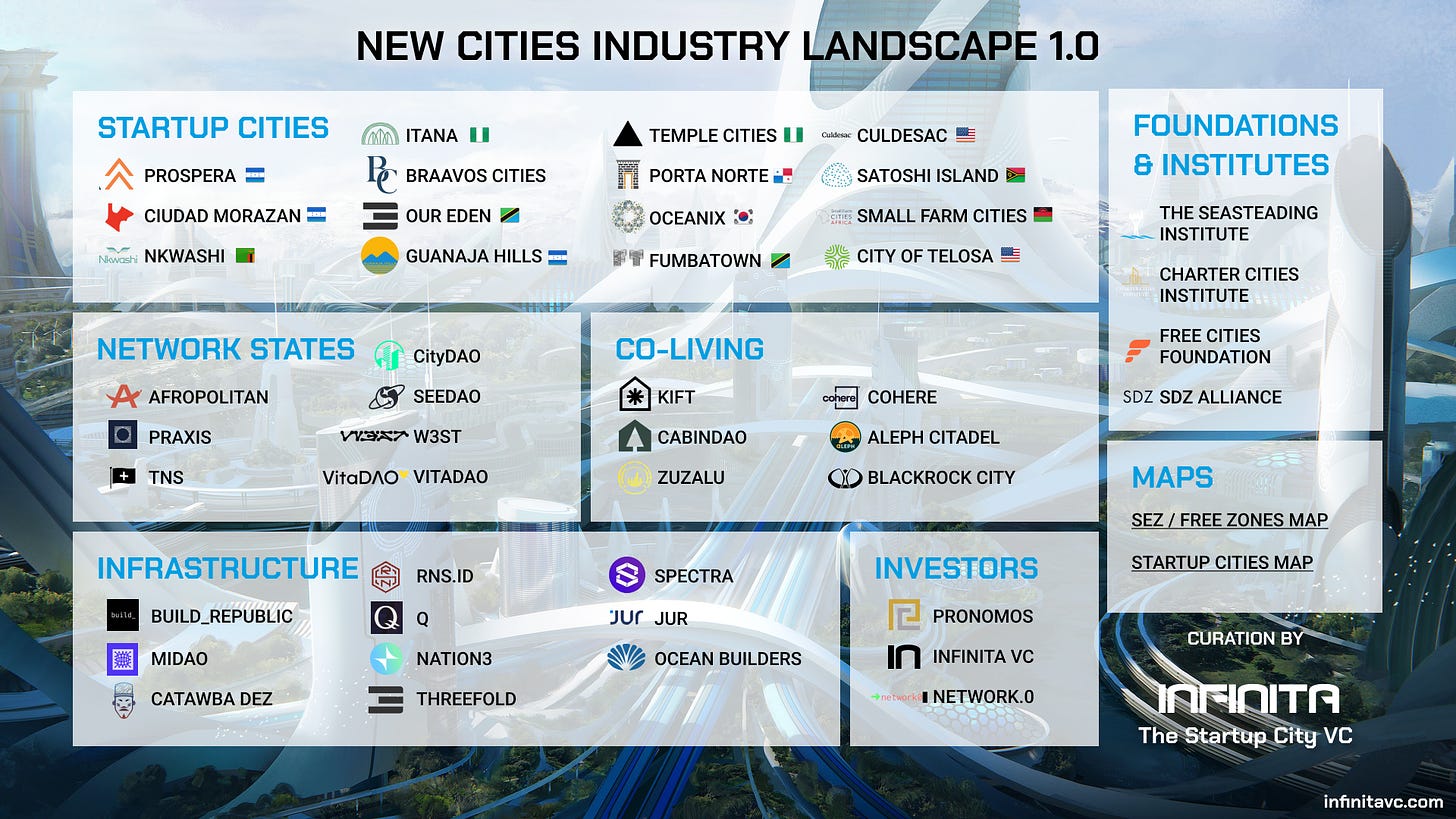Introducing the New Cities & Network States Industry Landscape 1.0
Why this map?
Balaji Srinivasan’s “The Network State” has attracted lots of attention. I have enjoyed the read and it’s a massive positive externality for a movement I feel part of.
Yet there seems to be a lot of confusion.
Are network states like Discord Servers on steroids?
It seems to me a key message of the book is lost in many discussions: network states aim to create new governance models, delivered in the real world.
Online & crypto are fundamentally transforming our understanding of governance. Governance is not much more than bits in the human mind.
At the same time, governance is enforced in the real world. Cities are platforms where the provision of government services is bundled.
I discussed this with Patri Friedman, the founder of the Seasteading Institute and Pronomos Capital (to whom Balaji is an advisor):
There is a small industry of competitive governance, whose main products have been seasteads and charter cities. Charter cities have had breakthroughs, especially with the Honduran ZEDE laws that led to Prospera and Ciudad Morazan.
The Network State, as Patri agrees, is an iteration of the charter city model - it asks: how can we reduce the barriers to entry to get more startups to the starting line?
There are cool maps of new city developments by the Adrianopole Groupe (here and here), but there is not yet a “startup map” for this emerging industry that expresses how network states and charter cities are connected. I aim to bridge this gap.
Caveats
I don’t aim to be definitionally accurate.
Rather I want to advance the understanding of a yet super-nascent and fragmented space and give directionally helpful mental models while stating my biases.
Biases
I do a VC fund that invests in technology startups (see here). I see the new city space as an emerging industry. I aim to invest in companies that build on top of better legal and governance guardrails to unleash a new wave of technological progress.
This is why “innovative jurisdictions” such as Malta, Portugal, Costa Rica or El Salvador seem more like corporate innovation to me that can move the needle since they have direct access to big markets, but they rarely and less reliably deliver deep, transformational innovation. That said, Estonia has created tremendous innovations within the competitive governance space, and Palau looks promising too.
Private cities like Gurgaon, India, or Sandy Springs, Colorado, are also important, but they already seem like existing large players to me, not startups
Categories
Startup Cities - I use Zach Caceres’ lens of startup cities as a product (see e.g. here) with a full stack of a) laws & regulations, b) governance services, c) land & real estate.
Places that have a partnership or an MOU with an existing government that grants them the autonomy to provide the full-stack I call startup cities.
Network States - I follow Balaji Srinivasan’s definition, and I think of examples like Afropolitan and Praxis that have a clear intent and strategy to get partnerships with governments to be able to build cities populated by their communities.
I interpret network states as a strategy innovation with the same goal as startup cities: realize a moral innovation that is enforced through governance in the real world. Building a highly aligned online community is a means to this end.
Co-Living - these projects typically don’t aim for the full governance stack. Instead, they are more like “network states light”, they often have a moral innovation, but use existing legal and governance guardrails, e.g. CabinDAO & Kift.
They have features of network states too and see themselves aligned with the movement, but I created this grouping to distinguish things like WeWork or Selina from network states with the clear aim to create new full-stack cities.
They are not less ambitious necessarily, they just don’t need the full stack to deliver the moral innovation that they want to realize. They are more about nomadism, special interest communities, new ways of living, or ruralism/escapism.
Infrastructure - these projects typically advance the goals of this emerging ecosystem and build platforms and tools (virtual and even physical, like Ocean Builders).
Objections
I expect a lot of pushback.
I will take critical feedback and think it through carefully. Let me know any projects that are missing and why you think they should be on there, and let’s discuss different approaches to achieve the objective of upgrading governance.



